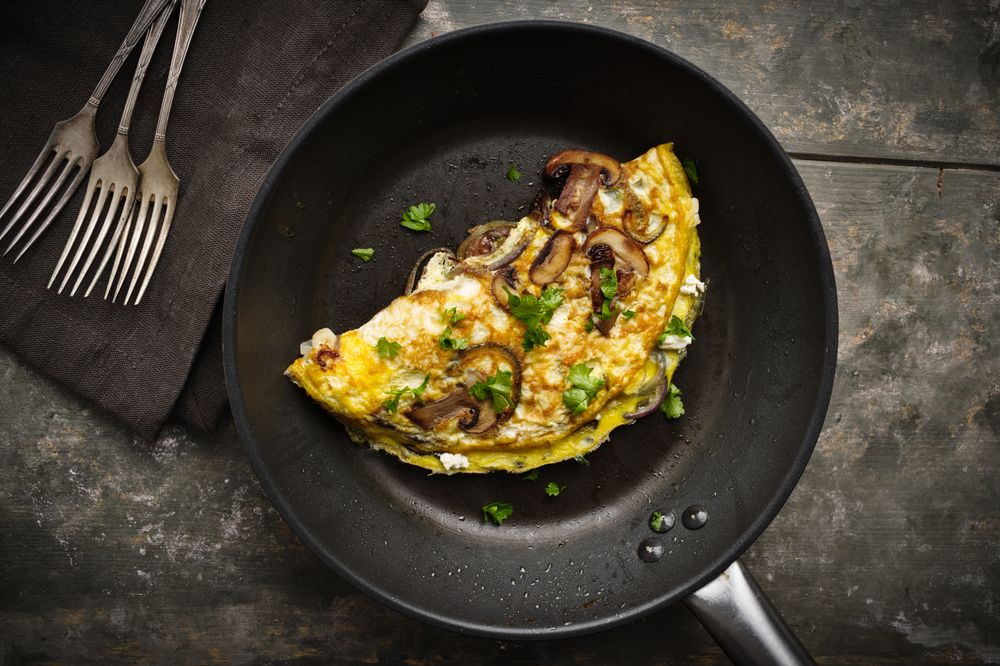Eggs and Proteins: Importance and Benefits

Sarah Gaur
October 12, 2022

Sarah Gaur
October 12, 2022
In today’s world, where all of us want to be healthy and fit, almost everyone knows the importance of proteins. Our bodies require protein for the mechanisms that provide energy and transport oxygen throughout our bodies.
We have more than 10,000 different varieties of proteins in your organs, muscles and tissues, bones, skin, and hair. Proteins aid in the production of antibodies that fight infections and diseases. In addition, it helps maintain healthy cells and the formation of new ones. Therefore, a lack of protein intake might cause health problems. For example, tissue breakdown might result in muscle loss. In addition, your body requires proteins to stay healthy and function properly.
The benefits of proteins are many. However, it is essential to consume an appropriate quantity of proteins. Like lack of protein may cause health issues. Therefore, we should always ensure that we don’t over or under consume proteins.
Please note: You may start losing muscle mass after the age of 40. Hence, you may need more protein.
Several protein-rich foods can help us fulfil our protein requirements. These foods include vegetarian sources like lentils, almonds, cottage cheese, broccoli etc. In addition, there are non-vegetarian sources like chicken, meat, tuna fish etc., which are rich in protein. However, many experts and nutritionists believe that eggs are one of the healthiest protein-rich foods. At the same time, several egg benefits may help us stay healthy.
It is a widely known fact that eggs are pretty nutritious. However, eggs might appear very small in size, but they’re an excellent source of protein. Many people have eggs as their go-to breakfast in the morning. They are effortless to consume and are not costly.
One small egg (38g) contains:
Nutrients like lutein and zeaxanthin that effectively prevent diseases in the body are abundant in eggs. For example, these carotenoids help lower the chance of age-related macular degeneration, the primary cause of blindness among the elderly. In addition, the choline part of the eggs can facilitate brain development and improve memory.
Folate and choline, in particular, are necessary for cell development, DNA replication, and hormone secretion. At the same time, calcium and magnesium help our bodies manage blood sugar, blood pressure, neurons, muscles, and the strengthening of bones by building and activating hundreds of different enzymes.
For the last few decades, there has been an increased concern regarding the cholesterol content of eggs. As a result, many people avoid eating eggs, especially egg yolks. A single egg of medium size has 186 mg of cholesterol, which is 62% of the recommended daily intake (RDI). The egg white is primarily protein and has a lower cholesterol level.
As per scientific studies, a daily intake of up to three eggs is safe to consume.
The eggshell is among the most noticeable and unique elements of the complete structure of the egg. While many of us throw away these shells in the garbage, it is worth knowing that they have a very distinguished and complex structure.
The membrane of the eggshell majorly consists of protein in the form of collagen. In addition, chondroitin sulfate and glucosamine are a few other nutrients that constitute an eggshell.
It is commonly known as egg whites. The thin and translucent fluid accounts for more than 60% of the internal weight.
Egg whites are 90% water, and the remaining 10% is exclusively protein.
One egg will have the following nutrients and minerals in its Albumen:
Egg yolks are the primary source of nutrition for the developing embryo inside the egg. They provide vitamins, minerals and healthy fats to the embryo, necessary for healthy growth to the embryo. Even the yolks that are unfertilised carry the same nutritional content. The egg yolks contain more than 50% of the whole egg’s nutritional content.
One standard egg yolk contains:
Many people avoid eating eggs because of a misconception. People believe that it increases the cholesterol levels in our bodies. However, studies suggest that the cholesterol increase in HDL. So, there is nothing to worry about. HDL stands for High-Density Lipoprotein and high HDL levels reduce the risk of heart disease and stroke.
Now, let us clarify the cholesterol paradox. Your liver manufactures cholesterol daily. But it generates less of it when you eat more eggs. As a result, everything balances out. The leading cause of increased cholesterol is saturated fats from consuming processed foods and not eggs.
Like any other food, you should consume eggs in moderation. If you consume them fried in oil and butter, they will not suit your heart. However, as per studies and the properties of eggs, they contain nutrients good for the heart and prevent heart-related diseases. Eggs contain folate, unsaturated fatty acids, vitamin E, and B vitamins. All this makes eggs a healthy food to include in your diet for a healthy heart.
Vitamin A in eggs is necessary for eye health. The deficiency of vitamin A insufficiency is the leading cause of visual impairment in children in developing nations. Therefore, it emphasises the necessity of vitamin A. In addition, lutein and zeaxanthin are two nutrients that can help prevent macular degeneration and cataracts. Eating one egg yolk per day increases the blood levels of each of these nutrients.
An egg contains 125.5 mg of choline (about 14% of your daily need). Choline is healthy for your heart and your brain. Choline aids with memory and mood regulation. Studies prove that it aids cognitive abilities such as verbal and visual memory. Choline boosts the creation of membranes present near the body cells. In addition, choline is vital for developing the baby’s brain during pregnancy and breastfeeding.
As per Havard research, eggs significantly lower the risk of breast cancer. However, it works best if consumed from adolescence.
Eggs contain Omega-6 fatty acids, polyunsaturated fatty acids (PUFA). These fatty acids reduce the risk of breast cancer by increasing anti-inflammatory molecules. In addition, they help decrease proinflammatory eicosanoids (compounds that cause inflammation).
Furthermore, eggs include choline, a B-complex vitamin that aids in the correct functioning of cells regardless of age or gender. At the same time, these vitamins help lower the chance of breast cancer.
You can consume eggs in various ways. There are several preparations, and it is simple to pair with other nutritious foods, such as vegetables. In addition, cooking the eggs kills potentially harmful bacteria, making them safe to consume. Here are a few ways you can eat eggs to get the protein you need.

Boiled eggs are one of the most common ways of consuming eggs worldwide. It doesn’t take time and is very easy to make. You just need to put the egg in a container with boiling water in it.
Boil it for about 6 to 7 minutes based on how much you want to cook the yolk inside. The longer you leave it to boil, the more firm the yolk will be.
As the name suggests, poached egg is cooked after removing their shells.
The process is known as poaching. Poaching involves cooking the eggs at a lower temperature than hard-boiled eggs, resulting in a more delicately boiled egg.
A fried egg is another way of having eggs. You can make it using one or more eggs separated off their shells and fried with minimum garnish in a hot pan.
Fried eggs are a ubiquitous breakfast in many countries. In addition, since it is very light, you can eat it at any time of the day. But, remember to use only healthy oil in adequate quantity.
Another delicious way of eating eggs for their nutritional benefits is in the form of scrambled eggs. It is an easy yet delicious way to consume eggs.

Omelettes are yet another popular and easy to make egg dish that you can consume for protein intake. In addition, it is very light for your stomach.
However, you need to remember that the additional ingredients you add to your omelette are healthy. Too much full-fat butter or unrefined oil may take away the beneficial properties of the dish.
Eating eggs can lead to a bloated stomach after eating eggs in people intolerant to eggs. The egg intolerance symptoms are flatulence, stomach cramps, nausea and vomiting and headaches. Moreover, eating too many eggs can lead to insulin resistance. Eggs also contain progesterone. Some people may develop acne and pimples because of increased progesterone levels in the body.
It has different effects on different people, depending mainly on their metabolism.
Eggs are one of the best sources of protein. However, they contain less dietary protein than meat or chicken. But, eggs have several other health benefits. In addition, they are easy to consume, and you can eat them on the go. Therefore, eggs are one of the healthiest protein-rich foods.
Furthermore, you can eat them boiled, fried or in various other recipes. No matter how you consume them, you can reap all their benefits. So, include an adequate amount of eggs in your diet and enjoy the multiple benefits of the superfood.
A: Two eggs will amount to approximately 12 grams of protein. Therefore, you need to eat it with other food items containing nutrients. That will help fulfil the minimum daily nutrient requirement.
A: A single egg contains 6 to 7 grams of protein. It is approximately 20% of the recommended dietary intake (RDI) for men, 27% for women and 33% for children.
A: Eating three eggs in a day will give you sufficient protein. However, overconsumption may lead to some side effects.
A: Yes, they are a rich source of high-quality protein and amino acids.
A: Other foods rich in protein include tofu, cheddar cheese, almonds, black beans and greek yoghurt.
A: Egg whites have the most protein content in an egg. One egg white contains 4-5 grams of proteins.
A: Since both are made from eggs, they are rich in protein and nutrients. However, it is recommended to eat boiled eggs.
A: Egg yolks contain essential nutrients in abundance. They are suitable for healthy body development. Contrary to common belief, egg yolks don’t increase bad cholesterol. Hence, it is safe to consume.
A: It does not matter how you consume an egg. It will give you the same amount of protein in every case. However, it is best to eat boiled eggs.
A: Chicken has more protein than eggs. One large egg can give you approximately 5 grams of protein. At the same time, one serving of chicken can give you more than 20 grams of protein.
A: Meat has more protein content than eggs. However, eggs are easy to cook and consume. Therefore, they are both healthy and provide several health benefits.
A: You should eat eggs as per your protein requirement. However, three eggs per day is a standard limit.
A: Egg white protein is better than whey protein because it has lower calorie content and is dairy-free. In addition, unlike whey, it does not increase blood sugar.

